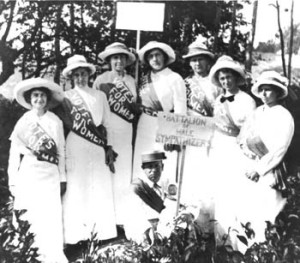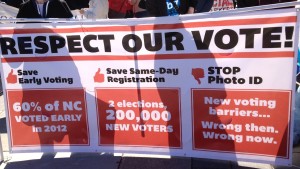>> BY TARA ROMANO, PRESIDENT OF NORTH CAROLINA WOMEN UNITED 93 years ago suffragists in this country finally achieved what they had set out to do: women had won the right to vote with the passage of the >>19th amendment to the U.S. Constitution, which prohibited barring women from voting because of their gender. This was hardly a guarantee of universal suffrage, as many other barriers – including ones based on race, class, and ethnicity – disenfranchised numerous women and men who had the right to vote in theory, but were unable to put that right into practice. But as with the >>15th amendment, this was an important step towards universal suffrage.
BY TARA ROMANO, PRESIDENT OF NORTH CAROLINA WOMEN UNITED 93 years ago suffragists in this country finally achieved what they had set out to do: women had won the right to vote with the passage of the >>19th amendment to the U.S. Constitution, which prohibited barring women from voting because of their gender. This was hardly a guarantee of universal suffrage, as many other barriers – including ones based on race, class, and ethnicity – disenfranchised numerous women and men who had the right to vote in theory, but were unable to put that right into practice. But as with the >>15th amendment, this was an important step towards universal suffrage.
72 years in the making, the 19th Amendment was certified and officially made part of the Constitution on August 26, 1920, a day now commemorated as >>Women’s Equality Day. What does women’s equality mean here in North Carolina, beyond marking this historic event?
- Does it mean we content ourselves with equality in theory when we know in practical terms women still face inequality in pay and workplace protections and opportunities; restricted access to reproductive health care; increased risk of violence at the hands of our partners; and under-representation in our government?
- Does it mean we only provide equality for certain women, those who fit an increasingly narrow definition of what it means to be a “worthy” of that equality?
- Does it mean we pursue equality for our own goals, thinking those other women who need additional supports will eventually catch up?
I think about these questions as we attempt to honor the efforts of the activists who brought about this amendment without ignoring all of the work that still needs to be done to achieve full equality for all North Carolina women.
>> Some of the early suffragists recognized that the right to vote was not the end of the pursuit of women’s equality, but just the first step. While voting is crucial to bringing women’s voices to the policy debate, it is nowhere near enough needed to inform legislative policy with the details and nuances of women’s lives and experiences in a way that results in policies that support women. Election campaigns ultimately tend to be heavy on concepts, light on details, and that’s not likely to change any time soon. But as campaigns debate larger issues about social values and theoretical economic policy, we are less likely to see the issues of affordable child care, domestic and sexual violence, pay discrimination, family-friendly workplace supports and poverty be discussed in any depth. So when those issues do come before lawmakers, women must bring their voices to those discussions, beyond voting. Women who are punished in the workplace because of the violence they experience at home; or who’s responsibilities to care for family members keeps them from obtaining good jobs or being able to get to the polls; or who need to structure and plan their families in ways that work best for them have to bring their stories to lawmakers as this legislation is introduced.
Some of the early suffragists recognized that the right to vote was not the end of the pursuit of women’s equality, but just the first step. While voting is crucial to bringing women’s voices to the policy debate, it is nowhere near enough needed to inform legislative policy with the details and nuances of women’s lives and experiences in a way that results in policies that support women. Election campaigns ultimately tend to be heavy on concepts, light on details, and that’s not likely to change any time soon. But as campaigns debate larger issues about social values and theoretical economic policy, we are less likely to see the issues of affordable child care, domestic and sexual violence, pay discrimination, family-friendly workplace supports and poverty be discussed in any depth. So when those issues do come before lawmakers, women must bring their voices to those discussions, beyond voting. Women who are punished in the workplace because of the violence they experience at home; or who’s responsibilities to care for family members keeps them from obtaining good jobs or being able to get to the polls; or who need to structure and plan their families in ways that work best for them have to bring their stories to lawmakers as this legislation is introduced.
And lawmakers need to listen to these voices, something that didn’t happen much this latest session, unfortunately. In a year that started out with a report on the status of women in North Carolina that showed:
- nearly one in five North Carolina women live in poverty;
- more than one in five women aged 18 to 64 lack health insurance;
- over 40% of working women in NC are the primary breadwinners for their families; yet
- women in NC still earn an average of 83% of men’s earning for the same work (the disparity is even greater for women of color); and
- single women with children are more likely to live in poverty than any other type of family.
>> We saw legislation that cut unemployment benefits, reduced access to health care, restricted access to reproductive health care, cut funding for support and educational services, and put restrictions on how we exercise our right to vote. And the pay equity legislation that was introduced this past April never even got to a hearing. This isn’t the way towards equality for women in North Carolina.
We saw legislation that cut unemployment benefits, reduced access to health care, restricted access to reproductive health care, cut funding for support and educational services, and put restrictions on how we exercise our right to vote. And the pay equity legislation that was introduced this past April never even got to a hearing. This isn’t the way towards equality for women in North Carolina.
When I envision equality for women in NC, I start with the vision that women’s voices will be heard and respected. I don’t expect we will be patronized with legislation that claims to recognize gender discrimination while really serving to discriminate against certain groups of women; or to be handed a plate of cookies when we want to discuss an issue of critical importance to women’s health. We don’t want to be demeaned with sexist comments about our abilities, or demonized about what kind of mothers we are. And dismissing our concerns “because women in (another country) have it worse” is belittling the work women are doing in any country to advance their rights as well as avoiding the issue at hand. The women of North Carolina deserve better.
My vision for women’s equality in North Carolina includes:
- supporting women’s choices in however we want to structure our families,
- valuing the work we do both inside and outside of the home, and demonstrating that with tangible supports,
- allowing us to control our reproductive lives, including how we want to conduct our pregnancies and birthing options,
- commitments to end the violence perpetuated against us simply because we are women, and
- respecting our vote and voice, acknowledging that we know our lives better than anyone else and have unique perspectives to bring to the policy table that can improve our society for all.
As we commemorate this day and honor the work of those who came before us, let’s also take a moment to honor the work being done now that will set the foundation for equality for the women who will come after us.
Congrats for this analysis and direction to Tara and our wonderful new voice Wpmen Advance!